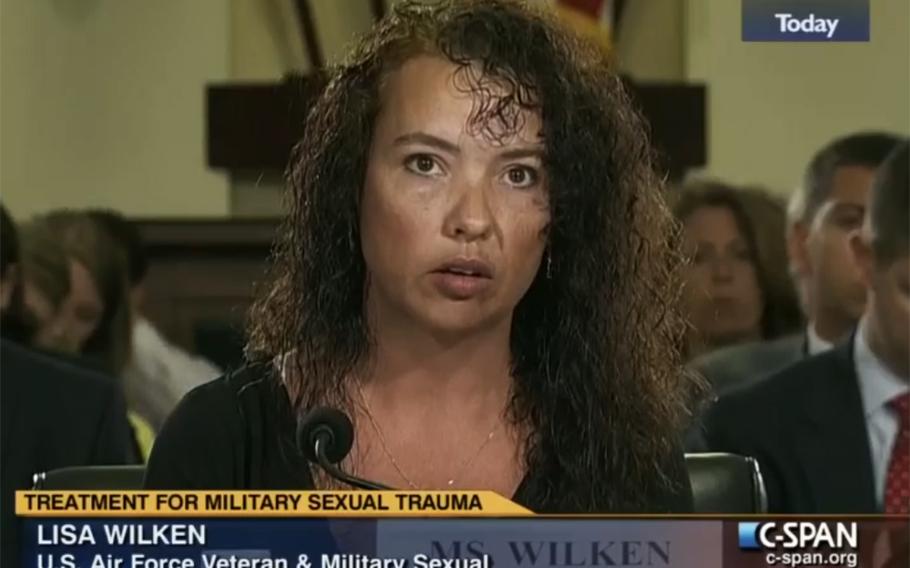
In a screen capture from a C-Span video, Lisa Wilken testifies at a House Veterans' Affairs subcommittee hearing in July, 2013. (C-Span)
WASHINGTON – An Air Force general has issued an apology to a veteran after she raised concerns about how military investigators handled reexamining her 20-year-old rape case.
Lisa Wilken, a former airman and veterans advocate, said two military investigators showed up at her Indiana home unannounced three weeks ago after she recently tweeted about her rape, which happened in 1994. She said the surprise visit was inappropriate, noting most rape survivors want to tell their stories on their terms and it felt “big-brotherish” that the military was monitoring social media. It’s possible other women could be uncomfortable telling their stories knowing the Defense Department is in the audience, Wilken said.
“It is never our intent to put survivors of crime through additional trauma,” Brig. Gen. Terry Bullard, commander of the Air Force Office of Special Investigations, wrote in a letter to Wilken. “OSI stands ready to listen to victims and survivors, provide them a voice no matter how long ago their sexual assault occurred, and to guarantee their opportunity to receive support.”
Wilken, 49, served in the Air Force between 1994 and 1996. She is the chairwoman of AMVETS National Women Veterans Committee and testified before a House Veterans’ Affairs Committee subpanel in 2013 about her attack, which led to two surgeries and a medical discharge. She said she has a 90% service-connected disability rating from the VA, 50% of which is from post-traumatic stress disorder as a result of the attack. Bullard also said investigators were able to eventually retrieve the records of Wilken’s case, after investigators initially told her that there were no records.
Wilken said there are situations the military should reach out to survivors, especially as the military reconciles with sex crimes across the force.
The Defense Department’s fiscal year 2019 report on sexual assault in the military said there were 7,825 sexual assault reports involving service members as victims or subjects, a 3% increase compared to 2018.
Wilken said the first contact with an apparent victim should be via phone or a letter. Bullard wrote in his letter that OSI is determining ways to make contact with a victim that are “the least intrusive,” and more informed and supportive if in-person contact is the only avenue.
Wilken said there was nothing to be done to revisit the case since her attacker was out of the military. He received an other-than-honorable discharge after an Article 32 hearing and served no time in jail.
On July 9, Wilken tweeted a news story about the killing of Army Spc. Vanessa Guillén at Fort Hood, Texas, by another soldier and how her death spurred women across the military to share their stories of rape, sexual assault and harassment.
“#IAmVanessaGuillen. They wonder why we don't tell! I told & expected justice. I was so young & dumb. The prosecutor said to me ...
"Lisa, I can prove he raped you, but the rape wasn't violent enough for him to get any real jail time." Government Property,” Wilken tweeted.
The Air Force Office of Special Investigations monitors social media for anecdotes of potential victims of sexual crimes and investigators spotted Wilken’s tweet, which led to investigators showing up at her door.
OSI has identified more than a dozen allegations of sexual assault via social media, according to Linda Card, an OSI spokeswoman. However, the scope of the Air Force’s social media monitoring remains unclear as Card said she could not discuss tactics and procedures.
“Since the advent of social media platforms, OSI has recognized that both perpetrators of crime and victims of crime can and do have an online presence,” Card said. “As a law enforcement organization, OSI has always paid attention to public spaces wherein our Air Force and DoD community may seek to report wrongdoing or crime affecting our force. Social media represents one such public space.”
Beynon.Steven@Stripes.com Twitter: @StevenBeynon